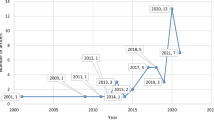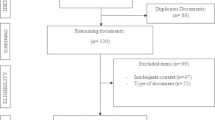Abstract
The main objective of the study was to identify variables and factors affecting Digital Citizenship (DC) in education sector. The study used Preferred Reporting Items for the Systematic Review and Meta-analysis (PRISMA) guidelines for achieving the objectives of the study. Moreover, a search strategy was formulated including keywords, inclusion, and exclusion criteria. The researchers initially, retrieved 2192 studies from selected databases (Google Scholar, Web of Science, and Scopus) and manual search. Thirty relevant studies were selected that fulfilled objectives of the study and inclusion criteria. Extracted data was later analyzed qualitatively by using thematic analysis and four factors that affect DC were identified during the process. The most identifiable factors include personal, psychological, technological and information related, and social factors. The study also revealed the most prominent variables (categories) related to these factors. The researchers have learned through literature review that no comprehensive study has been conducted in identifying the factors affecting digital citizenship. The current study recommended the importance of using factors and variables that affect DC in the education sector so that it can help decision makers take into account personal, psychological, technological and social factors while developing information literacy instruction programs for digital citizenship, especially in education sector.





Similar content being viewed by others
References
Akcil, U., & Bastas, M. (2021). Examination of university students' attitudes towards E-learning during the COVID-19 Pandemic Process and the Relationship of Digital Citizenship. Contemporary Educational Technology, 13(1), ep291. https://doi.org/10.30935/cedtech/9341
Al-Abdullatif, A., & Gameil, A. (2020). Exploring students’ knowledge and practice of digital citizenship in higher education. International Journal of Emerging Technologies in Learning (iJET), 15(19), 122–142.
Aladağ, S., & Çiftci, S. (2017). An investigation of the relationship between digital citizenship levels of pre-service primary school teachers and their democratic values. European Journal of Education Studies, 3(6), 171–184.
Al-Zahrani, A. (2015). Toward digital citizenship: Examining factors affecting participation and involvement in the Internet society among higher education students. International Education Studies, 8(12), 203–217.
AlZebidi, A. A., & Alsuhaymi, D. S. (2021). Investigating students' digital citizenship practices for undergraduate students at Al-Qunfudhah University College. Elementary Education Online, 20(5), 2089–2104.
Ata, R., & Yıldırım, K. (2019). Turkish pre-service teachers’ perceptions of digital citizenship in education programs. Journal of Information Technology Education: Research, 18, 419–436.
Avcı, Ü., & Durak, H, Y. (2022). Examination of digital citizenship, online information searching strategy and information literacy depending on changing state of experience in using digital technologies during COVID-19 pandemic. Journal of Information Science, https://doi.org/10.1177/01655515221114455
Aygun, M., & Ilhan, G. O. (2020). Analysis of in-Service and Pre-Service Social Studies Teachers’ Digital Citizenship. International Online Journal of Educational Sciences, 12(4), 123–146.
Capuno, R., Suson, R., Suladay, D., Arnaiz, V., Villarin, I., & Jungoy, E. (2022). Digital citizenship in education and its implication. World Journal on Educational Technology: Current Issues, 14(2), 426–437.
Choi, M., Glassman, M., & Cristol, D. (2017). What it means to be a citizen in the internet age: Development of a reliable and valid digital citizenship scale. Computers & Education, 107, 100–112.
Çiftci, S., & Aladag, S. (2018). An Investigation of Pre-Service Primary School Teachers’ Attitudes towards Digital Technology and Digital Citizenship Levels in Terms of Some Variables. International Education Studies, 11(1), 111–118.
Coklar, A. N., & Tatli, A. (2020). Evaluation of Digital Citizenship Levels of Teachers in the Context of Information Literacy and Internet and Computer Use Self-Efficacy. Asian Journal of Contemporary Education, 4(2), 80–90.
Cristol, D. & Gimbert, B.G. (2018). Teachers as digital citizens: Factors influencing teachers’ levels of digital citizenship. In Parsons, D., Power, R., Palalas, A., Hambrock, H., & MacCallum, K. (Eds.), Proceedings of 17th World Conference on Mobile and Contextual Learning (pp. 1-7). Concordia University Chicago, Chicago, IL, USA.
Dedebali, N. C., & Dasdemir, I. (2019). Social studies teacher candidates’ perception of digital citizenship. International Journal of Educational Methodology, 5(3), 465–477.
Elcicek, M., Erdemci, H., & Karal, H. (2018). Examining the relationship between the levels of digital citizenship and social presence for the graduate students having online education. Turkish Online Journal of Distance Education, 19(1), 203–214.
Erdem, C., & Koçyigit, M. (2019). Exploring Undergraduates’ Digital Citizenship Levels: Adaptation of the Digital Citizenship Scale to Turkish. Malaysian Online Journal of Educational Technology, 7(3), 22–38.
Erdogan, E., & Tonga, D. (2020). Middle School Students and Digital Citizenship: Is Technology Important for Digital Citizens in Turkey? Online Submission, 5(11), 194–227.
Farmer, L. (2011). Teaching digital citizenship. In C. Ho & M. Lin (Eds.), Proceedings of e-learn 2011--world conference on e-learning in corporate, government, healthcare, and higher education (pp. 99-104). Honolulu, Hawaii, USA: Association for the Advancement of Computing in Education (AACE). Retrieved April 24, 2023 from https://www.learntechlib.org/primary/p/38680/
Hakdar, E., Yazici, H., & Kaya, M. T. (2022). Study of the relationship between digital citizenship and basic technology qualification levels of social studies teachers. African Educational Research Journal, 10(4), 454–464.
Hussainy S.S., & Jamalullah. R. S. (2021). A Study on Factors Affecting Digital Citizenship Among College Faculties in India. PUPIL: International Journal of Teaching, Education and Learning, 4(3), 49–61.
Imer, G., & Kaya, M. (2020). Literature Review on Digital Citizenship in Turkey. International Education Studies, 13(8), 6–15.
Jæger, B. (2021). Digital Citizenship – A review of the academic literature. Dms – der moderne staat – Zeitschrift für public policy, recht und management, 14(1–2021), 24–42. https://doi.org/10.3224/dms.v14i1.09.
Jones, L. M., & Mitchell, K. J. (2016). Defining and measuring youth digital citizenship. New Media & Society, 18(9), 2063–2079.
Kara, N. (2018). Understanding university students’ thoughts and practices about digital citizenship: A mixed methods study. Journal of Educational Technology & Society, 21(1), 172–185.
Ke, D., & Xu, S. (2017). A Research on factors affecting college students' digital citizenship. In 2017 International Conference of Educational Innovation through Technology (EITT), Osaka, Japan, 2017 (pp. 61–64). IEEE, https://doi.org/10.1109/EITT.2017.23
Liberati, A., Altman, D. G., Tetzlaff, J., Mulrow, C., Gøtzsche, P. C., Ioannidis, J. P., ... & Moher, D. (2009). The PRISMA statement for reporting systematic reviews and meta-analyses of studies that evaluate health care interventions: explanation and elaboration. Journal of clinical epidemiology, 62(10), e1–e34.
Liu, Y., & Liu, Q. (2021). Factors influencing teachers’ level of digital citizenship in underdeveloped regions of China. South African Journal of Education, 41(4). https://doi.org/10.15700/saje.v41n4a1886
Miles, D. (2011, June). Youth protection: Digital citizenship—Principles & new resources. In 2011 Second Worldwide Cybersecurity Summit (WCS), London, UK, 2011, pp. 1–3.
Nosko, A., & Wood, E. (2011). Learning in the Digital Age with SNSs: Creating a Profile. In B. White, I. King, & P. Tsang (Eds.), Social Media Tools and Platforms in Learning Environments (pp. 399–418). Springer Berlin Heidelberg. Retrieved from https://doi.org/10.1007/978-3-642-20392-3_24
Oyedemi, T.D. (2020). The theory of digital citizenship. In: Servaes, J. (eds) Handbook of Communication for Development and Social Change. Springer. https://doi.org/10.1007/978-981-15-2014-3_124
Ozer, E. A., & Ozer, U. (2020). Effects on digital citizenship: The Turkish pre-service teachers’ perspective. Croatian Journal of Education, 22(2), 397–424.
Park, Y. M., Chae, J. H., Kim, S. K., & Kwon, H. S. (2021). The effects of media literacy education and its influence on digital citizenship: Focusing on CMF education programs in Korea. The Journal of Information Systems, 30(3), 113–135.
Ribble, M., & Bailey, G. (2007). Digital Citizenship in Schools. Washington, DC: International Society for Technology in Education.
Prasetiyo, W. H., Naidu, N. B. M., Tan, B. P., & Sumardjoko, B. (2021a). Digital Citizenship Trend in Educational Sphere: A Systematic Review. International Journal of Evaluation and Research in Education, 10(4), 1192–1201.
Prasetiyo, W. H., Naidu, N. B. M., Sari, B. I., Mustofa, R. H., Rahmawati, N., Wijaya, G. P. A., & Hidayat, O. T. (2021b). Survey data of internet skills, internet attitudes, computer self-efficacy, and digital citizenship among students in Indonesia. Data in Brief, 39, 107569.
Ribble, M. S., Bailey, G. D., & Ross, T. W. (2004). Digital citizenship: Addressing appropriate technology behavior. Learning & Leading with Technology, 32(1), 6.
Richardson, J. W., Martin, F., & Sauers, N. (2021). Systematic review of 15 years of research on digital citizenship: 2004–2019. Learning, Media and Technology, 46(4), 498–514.
Şenel, M. (2022). Investigating the Digital Citizenship Levels of ELT Students within the Scope of Remote Learning. Journal of English Language Teaching and Linguistics, 7(2), 327–347.
Shamseer, L., Moher, D., Clarke, M., Ghersi, D., Liberati, A., Petticrew, M., ... & Stewart, L. A. (2015). Preferred reporting items for systematic review and meta-analysis protocols (PRISMA-P) 2015: Elaboration and explanation. BMJ, 349. https://doi.org/10.1136/bmj.g7647
Shi, G., Chan, K. K., & Lin, X. F. (2023). A systematic review of digital citizenship empirical studies for practitioners. Education and Information Technology, 28, 3953–3975. https://doi.org/10.1007/s10639-022-11383-z
Yon, K., & Saraç, L. (2022). Digital citizenship among physical education teaching majors. Nevşehir Hacı Bektaş Veli Üniversitesi SBE Dergisi, 12(4), 2075–2090.
Walters, M. G., Gee, D., & Mohammed, S. (2019). A literature review: Digital citizenship and the elementary educator. International Journal of Technology in Education (IJTE), 2(1), 1–21.
Wang, Q., Ma, H., & Xu, S. (2022). A Study on the Relationship between Digital Citizenship and Information Literacy among Middle School Students. In 2022 International Symposium on Educational Technology (ISET), Hong Kong, Hong Kong, 2022, pp. 73–76. https://doi.org/10.1109/ISET55194.2022.00023
Xu, S., Yang, H. H., MacLeod, J., & Zhu, S. (2019a). Social media competence and digital citizenship among college students. Convergence, 25(4), 735–752.
Xu, S., Liu, M., & Ma, D. (2023). Exploring secondary vocational students’ digital citizenship from the perspective of their social media competence. Computers in the Schools, 1–21. https://doi.org/10.1080/07380569.2022.2157230
Xu, S., Yang, H., & Zhu, S. (2019b). An Investigation of 21st-century Digital Skills on Digital Citizenship among College Students. In 2019b International Symposium on Educational Technology (ISET) (pp. 236–240). IEEE.
Yildiz, E. P., Çengel, M., & Alkan, A. (2020). Determination of Digital Citizenship Levels of University Students at Sakarya University Turkey. International Journal of Higher Education, 9(3), 300–308.
Zhong, J., Zheng, Y., Huang, X., Mo, D., Gong, J., Li, M., & Huang, J. (2021). Study of the influencing factors of cyberbullying among Chinese college students incorporated with digital citizenship: From the perspective of individual students. Frontiers in Psychology, 12, 621418.
Author information
Authors and Affiliations
Corresponding author
Ethics declarations
Conflict of interest
There is no conflict of interest.
Additional information
Publisher's note
Springer Nature remains neutral with regard to jurisdictional claims in published maps and institutional affiliations.
Note
Data sharing not applicable to this article as no datasets were generated or analysed during the current study.
Rights and permissions
Springer Nature or its licensor (e.g. a society or other partner) holds exclusive rights to this article under a publishing agreement with the author(s) or other rightsholder(s); author self-archiving of the accepted manuscript version of this article is solely governed by the terms of such publishing agreement and applicable law.
About this article
Cite this article
Ali, I., Butt, K. & Warraich, N.F. Factors effecting digital citizenship in education sector: A systematic review and future direction. Educ Inf Technol 28, 15789–15821 (2023). https://doi.org/10.1007/s10639-023-11811-8
Received:
Accepted:
Published:
Issue Date:
DOI: https://doi.org/10.1007/s10639-023-11811-8




